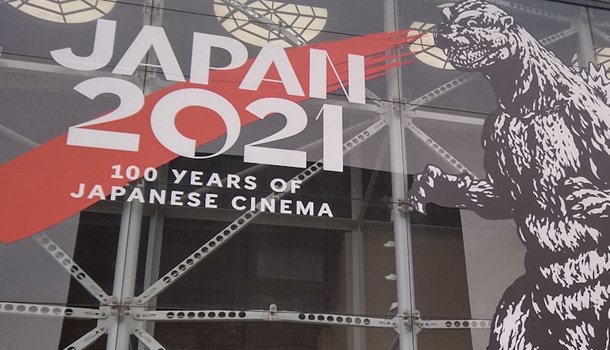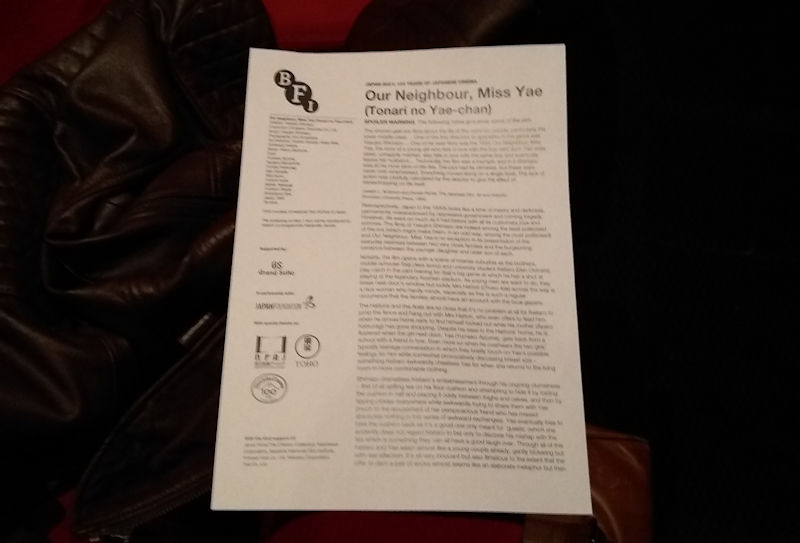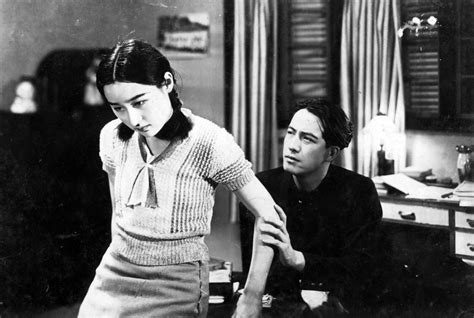
Written by Richard Durrance on 27 Oct 2021
Madness, true, yet there was method in it. When the British Film Institute Japan series was announced and I had the luck to have an early perusal and member’s booking, I made a conscious decision. Yes, Seven Samurai was going to be shown on the BFI Southbank’s main screen and as wonderful as it might be to watch Kurosawa’s film on the big screen, it will be shown again. As will the films of Ozu and, no, I didn’t decide to fill the shameful lack of Mizoguchi in my life (I've somehow still only ever seen two of his films, ones from the early thirties and boy were they good so I know, I need rectify this); Instead I decided to take the path least trodden. Or, the path to which (the page of) madness lies. I flicked through the pages of the programme and looked for those films I’d never heard of, that sounded intriguing, or I might never - like that chance screening of To Sleep So As To Dream – have the chance to see again.
But what am I wittering on about?
It is of course the first two months (and my first two films) of the BFI’s Japan film series, playing at the BFI Southbank. It was also my first films at the cinema since covid hit. I’m a lazy cinema visitor at the best of times but I knew I needed to buckle up my resolve and get out there and watch some films. The BFI was good enough to curate a series of films so it was only right that I take them up on their offer. It would have been rude not to book tickets, hand them some of my money; after all, covid has hit them just as much as every other company excepting Amazon (boo-hiss).
It seems I could not have chosen two more diverse films to start my Japan cinema weekend, Saturday: A Page of Madness (1926) – a silent film by Teinosuke Kinugasa (Gate of Hell) long thought lost, only for Kinugasa to find it in his garden shed in the 70's; and, Sunday: Our Neighbour, Miss Yae (1934), a quiet drama directed by Ozu’s mentor Yasujiro Shimazu.
Turning up I was surprised to see the BFI Southbank’s main doors open, though my first visit to the BFI since covid hit I’d been passed numerous times and seen entrances you’d never expect to see open, well, open; I mean the ones where you might otherwise catch a couple of staff taking a break smoking a cigarette or that resided next to the bins.
Godzilla’s atomic breath rained down over the side entrance, ready to destroy any travelling covid particles or cinema goer who might dare munch popcorn in any auditorium I might be sat in (screen 2 to be precise, for both films). Yet within the BFI, though somewhat overheated, all was quiet. Ahh the blessing of walking into the hallowed halls of cinema... the shop open if slightly empty and plenty of seating and space. And not a single nacho or box of popcorn or ten-gallon bucket of cola in sight. What more could I ask for? Free wi-fi? Check.
I awaited my calling to step forward into the auditorium, where I knew awaited many other masked figures and the great Stephen Horne at the piano. There is something wonderful about silent cinema with live accompaniment, especially piano. I almost cannot believe the luck I had growing up having access to all those cheap double-bills at the Riverside Studios in Hammersmith (before they knocked it down and built back up sans double-bills at the cinema), with the chance to watch two films with live piano plinking. It was just there, accessible and affordable and now I recognise how special it is; it also taught me that the pianist must – I mean must on pain of death – get a round of applause before and after the film. Not to do so, well, it borders on the nacho munching level of criminal behaviour. Nacho eaters take note, especially do not crunch through a live performance.
A Page of Madness (1926)
The single sheet of A4 awaited me at the entrance of the auditorium, reading material on the film as on the screen words flicked by asking us all to be thoughtful of others, provide space and the safety measures in place, but I was more interested in the double-sided words and I have to say I was glad I read it before watching the film because A Page of Madness though very, very good, is very hard to follow. Unusually for a silent film it has no title cards. Even FW Murnau’s The Last Laugh, oft touted as the silent film without them has one set of title cards. Murnau’s film tells a very straightforward story that is easy to access and decode. A Page of Madness is not.

Sometimes paper information is good and this was written by an ex-UKA writer... big boots to fill!
An old sailor takes a job as a janitor in an asylum to look after his wife, who he has driven insane. His daughter, finding he works there is shocked to find her mother is insane. She has come to tell them she is getting married and the discovery of her mother’s condition threatens the marriage. Racked by guilt, the janitor attempts to help his wife escape, only to be set upon by staff and inmates alike.
If this is roughly the story of the film, much of it is utterly opaque when watching. I honestly wasn’t sure exactly who the daughter seemed to be, the lack of title cards making much of the narrative difficult to discern. According to one of the reviews on the intro material, the second viewing is clearer but then the story doesn’t much matter to be honest; A Page of Madness is seventy minutes of remarkably radical filmmaking for the period. Though apparently unaware of German expressionism A Page of Madness bears remarkable visual comparison to many of the German masterpieces of the late teens and twenties (considering insanity is present most noticeably of course in Caligari). The opening, with sharp, quick editing and overlapping images is startling and electric, evoking the madness that is to come. The story that then unfolds does so in a dreamlike, sometimes almost hallucinatory narrative. The opening scene of one female inmate, dancing across her cell with bloody feet is quite remarkable; director Kinugasa shows us both reality and her subjective reality: a graceful dancer across the cell, elegant and skilled. Curiously, like many of the inmates, when we get a sense of their internal selves, they often seem, if not serene in their insanity, so lost to it that they're happy. The dancer sees herself as a great, elegant, balletic, kinetic human being and she is.
Interestingly though the wife seems to be the one inmate that seems the most genuinely disturbed. She is totally detached from reality and fails to recognise her husband at all, no matter how he tries to help her or give her extra food. In some ways these scenes are perhaps the least interesting but often some of the most revealing as it shows how miserable the janitor is. Often he is shot in close up, visually the most trapped person in the film, the real inmate, whereas the actual inmates always seem curiously free to roam. The janitor is in a world of his own making and he seems the most miserable character of all, having ruined his wife’s life and possibly now his daughter’s. His guilt is reflected in a surreal moment of lottery where he wins a wardrobe that he carries on his back to give to his daughter as a dowry (though to be honest I only got the context reading about it, watching the film it is just a brilliant but difficult to read sequence).

The energy of the mad dancer is frequently reflected on the screen: panning, swirling camerawork that so often characterised the best of silent cinema, where the camera could move unimpeded. This energy suffuses the film, aided by the swift cutting and overlapping creating often near surrealist imagery. The film is a visual joy and a dreamlike state is maintained throughout. It's also well paced, so that by the end of 70 minutes it doesn’t necessarily bring any conclusions except that it is a gorgeous exercise in experimental filmmaking, and as some have commented coming from a small studio with no money, the end results are remarkable. Much of the imagery rivals that coming out of Germany and companies like UFA with what was then their financial and technical muscle. Also, it is interesting that despite scenes of riots galore and faces pressed to bars, the inmates of the asylum are never patronised, never looked down on or shown to be awful, caricatured raving husks. If this is a horror film of sorts, then it is the horror of what happens within the soul of the guilty.
And then the live score by Stephen Horne. Ah, a joy and often I found my eyes moving his way, sat just to the side of us, at an upright piano. Mixing piano with moments of flute and sometimes plucking the piano strings to suggest more traditional Japanese instrumentation, the music flowed as it should to complement the images and never threatened to overwhelm them. As always it is so well done, so apparently simple that it is easy to neglect how much skill goes into it; when you hear a bad score to a silent film you really feel it. ;
(And remember applause before and after the film for the pianist. Or else...)
I was grateful though as I sat there, awaiting the call to watch A Page of Madness, that I didn’t succumb to also taking my chances and booking a ticket to see the film immediately after it, another silent, this time by Ozu. Having been awake since 4am, even during A Page of Madness I almost dropped off a few times (instead I walked back to the station then watched other films where if I fell asleep, I could just replay the disc). Oh and a psycho driver almost killed me on a crossing on the Bayswater Road. Witnesses, contact me at...
Our Neighbour, Miss Yae (1934)
Day 2, Sunday, and a pleasant walk through parks Hyde and St James’ from the station in the sunshine to approach the Southbank, and this time to see Our Neighbour, Miss Yae (1934). Directed by Yasujiro Shimazu, it unfolded in 76 minutes of beautifully observed, unobtrusive drama.
Unobtrusive drama seems to me a phrase that should be the death knell for almost any film, but Shimazu’s film, observing the Arai and Hattori families, raises unobtrusive almost to the point of sheer virtue. Eldest Arai son and student, Keitaro throws baseballs with his younger brother Seiji and though they accidentally smash the window of their Hattori neighbour's home, bringing the titular Miss Yae to the door, seems a minor everyday occurrence, as illustrated when the Hattori matriarch then returns home and only confirms that the Arai’s will pay for it. It’s just part of any other normal day. You’ll have guessed that these families are close; fathers will be shown drinking together, but where there is drama it will be in Yae’s affection for Keitaro and how, when her elder sister Kyoko arrives home, having left her husband, Kyoko also starts to fall for Keitaro.
The performances all come across as especially naturalistic, important when you want to create a slice-of-life that does not aim at histrionics. Often the low-key drama is apparent in the little things, such as when Yae brings her friend home, only to find Keitaro is in her home, alone, eating. He has found himself locked out so matriarch Hattori feeds him like he lives there, a son of the family and not just some neighbourhood kid. In a sequence that is both genuinely funny and beautifully observed, Keitaro manages to knock over teapots, pickles, soak the best cushion and have his socks taken from him by Yae, then to be chastised for his dirty feet and stinking, hole-filled socks. Yae's friend clearly sees what is going on under the surface, which neither Yae nor Keitaro do. The scene could have been played for pure laughs or arch drama but instead it just feels so natural. There is no big issue made of him spilling pickles all over the mat or anything else he mistakenly does. They are just a family and act almost like a married couple, one knowing the other so well, so casually intimate that they are entirely unaware of it. Yet to the friend and the audience it is so very evident. It’s the kind of scene that emphasises the strengths of the film and Shimazu’s direction. It’s the sheer naturalness of it, and when it ends it is with Yae being quizzed by her friend, who is near physically wrestling answers from Yae. The reality of it feels is staggering and this is in a film that would be in the first years of sound, when before acting would frequently have been more pantomimic. It’s a marvelous achievement and Yumeko Aizome as Yae in particular gave a brilliantly understated performance.

But of course, the sister Kyoko arrives bringing dismay to the family: how can a woman leave her husband? It seems to be ignored that Kyoko describes her husband as a drunk who seduced their maid and defrauded his company, So I think we’re firmly with Kyoko here. I mean he sounds a right git and, frankly, a failure. I mean he even gets caught in his fraudulent activity. The film’s position towards Kyoko is an intriguing and potentially troubling one. Kyoko’s story is never quite resolved and why is this? Is this because in not resolving it, the film is making a critical point about Kyoko’s emancipated behaviour? I felt not, for two reasons. Firstly, that her divorce seems to be something that the families seem to accept quite happily. Once they are over the shock-horror of a woman (justifiably) leaving her husband she seems to be accepted into the fold. Yes, she is a discombobulating figure in the drama and it is clear Yae resents her sister’s advances towards Keitaro, but this is understandable on both sides, because Keitaro is close to both sisters and jealousy happens. The second reason is the film ends when it does because why not? Any slice of life is essentially telling a story to a given point: life goes on afterwards just as it must have before the film started. Yae’s story, and it is Yae’s film, is arguably concluded as the film ends while other dramas persist. But that is part of another story that is only part – yes a big part - of the story that is Our Neighbour, Miss Yae.
And there's more...
You may be wondering if I have more films booked into the calendar? Yes indeed, but with December promising further gems, and more than a few Seijun Suzuki films. If the pictures within the BFI itself suggest are also true then some Takeshi Kitano too (gods, I can remember seeing Hana-Bi when it came out and retrospective double-bills of Violent Cop and Sonatine but that was so many years ago), I’ll be needing to hold back for then.
If there is a moral to this, then I don’t know what it is except I had the chance to see a couple of very good films that without the BFI I may never have enjoyed. I am also very lucky to be able to have these events close-by, but a selection is travelling the country and the BFI player contains a wealth of classic Japanese cinema (though sadly not A Page of Madness or Our Neighbour, Miss Yae). Or maybe it is that sometimes you need to look beyond just the classics and step into the unknown. OK, so A Page of Madness sounded right up my street but it could still have been terrible (unlikely but you never know); Our Neighbour, Miss Yae could have been dull as dishwater but was a delight.
That said, before Our Neighbour, Miss Yae there was a trailer for Seven Samurai and I must just change my mind on that one. Just as I might just have to go and book to see Onibaba if tickets are still available and I’ve not missed it. Choices... Choices...
Post Script:
The December programme was released a day or two after this was originally written and I was a bit disappointed to see only one Suzuki film: Tokyo Drifter and no Kitano, but there is the chance to see Battle Royale and Akira on the IMAX. Again: choices... choices...

Long-time anime dilettante and general lover of cinema. Obsessive re-watcher of 'stuff'. Has issues with dubs. Will go off on tangents about other things that no one else cares about but is sadly passionate about. (Also, parentheses come as standard.) Looks curiously like Jo Shishido, hamster cheeks and all.
posted by on 12 Sep 2025
posted by on 09 Sep 2025
posted by Ross Liversidge on 08 Sep 2025
posted by on 26 Aug 2025
posted by on 14 Aug 2025
posted by on 06 Aug 2025
posted by Ross Liversidge on 16 Jul 2025